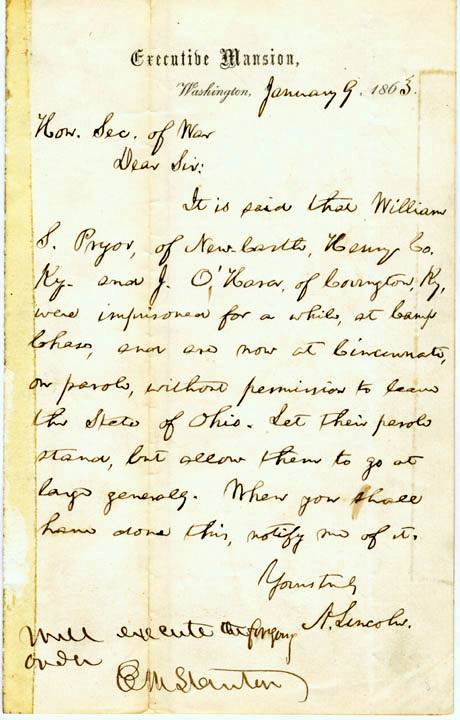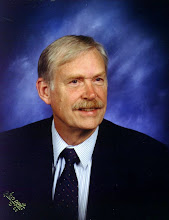
So there I was, about to turn off my computer a couple of days ago, and thinking about my great-grandfather Pryor. I had just written a small item about him for an attached web site. He has been dead almost a hundred years so there wasn’t much new with him. Anyway, I entered his name in the search spot in Google and wow! Up came a site for the sale of historical documents.
One of the documents for sale was a letter written at the Executive Mansion (of the President of the U.S.). The letter was written by Abraham Lincoln to Secretary of War Stanton about what to do with a couple of civilians who were in prison in Ohio.
One of the men was my great-grandfather. I knew he had been in prison at the behest of A. Lincoln but I didn’t know why. I always suspected it was because he had helped Confederate General John Hunt Morgan escape the Yankees in central Kentucky.
My great-grandfather did help Morgan, but the letter from Lincoln was written some eight months before Hunt had escaped! I had been wrong all these years about the reason for prison. Lincoln had tried by military court and imprisoned some 13,500 civilians in the North by the end of the War, so one more or less didn’t matter (KY was a neutral state).
Lincoln used the passive term when he wrote, “It is said that William S. Pryor is in prison . . .” He acted as if he didn’t know about it. But Lincoln’s good friend, Judge James Pryor was William S. Pryor’s fond uncle, and I bet Judge Jim leaned on Honest Abe a bit to let his favorite nephew out of the pokey. Abe, after all, was a very ordinary politician.
So I do not know why my great-grandfather was imprisoned. But I do know he was a lawyer and a good one from the size of his 1859 mansion.
Lawyers tend to lose their law licenses if they have been sent to prison, but imprisonment by Lincoln was reason for a merit badge, not a disbarment, and after the war my great-grandfather not only continued to practice law but also was made a circuit court judge. He served on the circuit for three years and then was appointed Chief Justice of the State Supreme Court. He was on that bench for twenty-six years, longer than anybody before or after.
Evidently, prison was a only graduate course.
I still want to find out what pretext was used to imprison him, other than the fact that he was a Democrat and Lincoln was a Republican. Kentucky politics can get rough.
Abraham Lincoln,John Hunt Morgan, Civil War,Kentucky,E.W. Stanton

